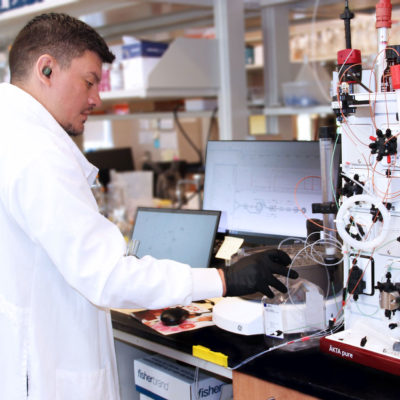by Bryan Munoz, PhD
As a scientist at the UNC Nutrition Research Institute my goal is to better humanity through research aimed at nutrients and their role on our health. I spend time in the lab each day applying advanced scientific methods to proteins in the folate metabolism pathway. While folate has mostly a protective role in certain cancers, in some situations, excessive folate intake, especially from high-dose supplements, has been associated with an increased risk of cancer. Our lab is trying to understand the role of these proteins in cancer.
Our work is vital and has the ability change the landscape of nutrition; but if it is not effectively communicated to the outside world, can our science actually have an impact? Beyond traditional dissemination through papers and presentations, there’s a growing acknowledgment of the need to engage a broader audience to bridge the science-society gap, fostering scientific literacy and public involvement. By connecting with this broader audience, researchers can share discoveries, inspire discussions, and advocate for evidence-based policies.
Communicating your research becomes an opportunity, not just a responsibility. It translates complex science into actionable insights, dispels misinformation, and aids decision-making, extending scientific influence beyond the lab and creating a lasting societal impact.
We are not to keep our discoveries hidden within the walls of academia. We firmly believe that the knowledge we gain can directly enhance the health and well-being of our communities. Nutrition affects us all, every day. It’s our duty to present our evidence-based insights in a way that’s easily understandable and relevant to the public.
The UNC Nutrition Research Institute seeks to educate the public through weekly e-news, social media and the Appetite for Life series. You can connect with us by subscribing, following us on various social media platforms (links below) and attending a free Appetite for Life public program series
Bryan Munoz is a postdoctoral research associate in the Sergey Krupenko Lab. Prior to joining the NRI, Munoz attended EARTH University in Costa Rica majoring in Agricultural Sciences. He continued his graduate career at the University of Nebraska, Lincoln and North Carolina State University, where he earned his doctoral degree in Nutrition and Horticultural Sciences.

